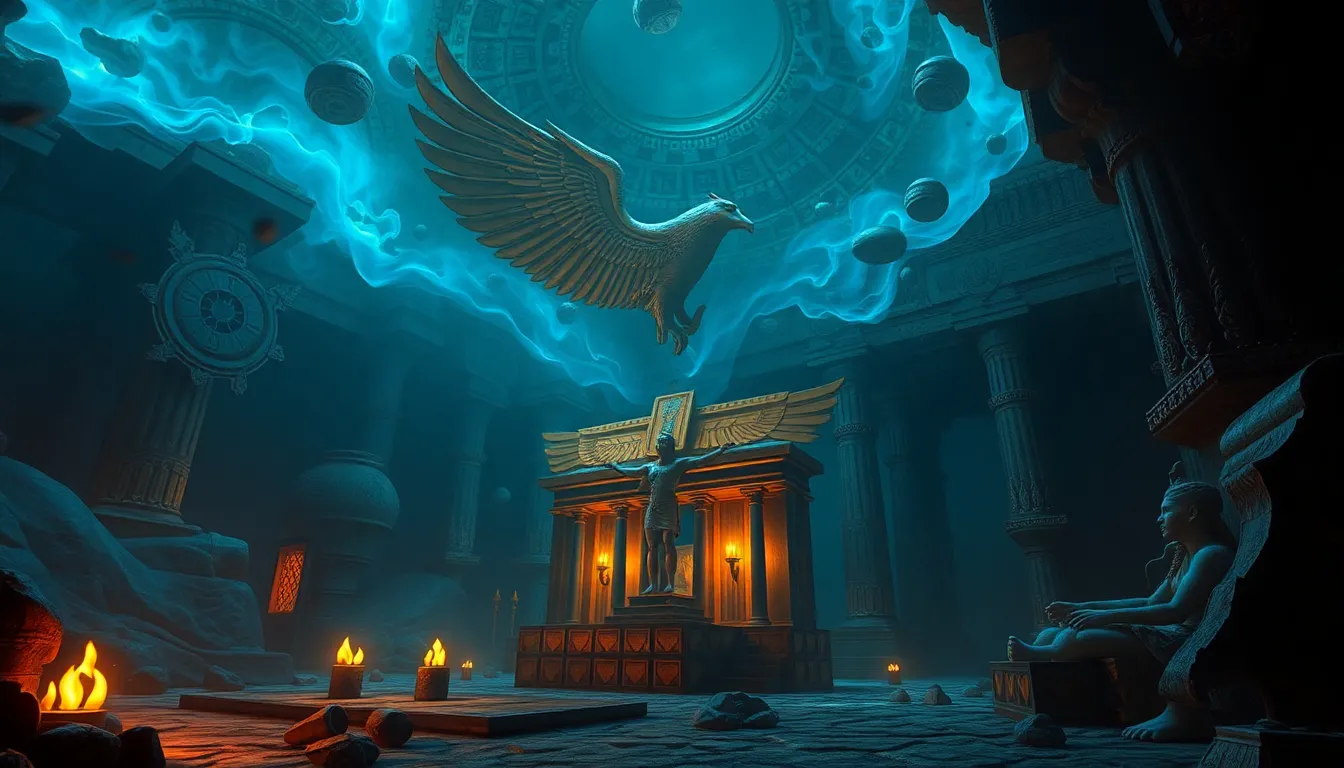The Role of the Underworld in Egyptian Religion
I. Introduction
Egyptian religion, characterized by a complex pantheon of gods and goddesses, rituals, and beliefs, played a crucial role in shaping the culture and society of ancient Egypt. It was deeply intertwined with the everyday lives of the Egyptians, influencing everything from governance to art. One of the most significant concepts in this belief system is the Underworld, known as the Duat, which represents the realm of the dead and the afterlife.
The Underworld was not merely a place of darkness and despair; it was a vital aspect of Egyptian cosmology that dictated the fate of souls after death. The beliefs surrounding the Underworld were fundamental to how Egyptians perceived life, death, and the afterlife, providing a framework for moral conduct and societal norms.
II. Mythological Foundations of the Underworld
The Underworld is populated by a variety of deities, each playing a distinct role in the journey of the soul. Understanding these key figures is essential to grasp the complexities of the Duat.
- Osiris: The god of the afterlife, resurrection, and agriculture, Osiris is one of the most important deities associated with the Underworld. He embodies the cycle of life, death, and rebirth, and is often depicted as a mummified king.
- Anubis: Known as the god of mummification and the afterlife, Anubis is depicted as a jackal or a man with a jackal’s head. He oversees the embalming process and guides souls through the Underworld, ensuring they find their way to Osiris.
- Ma’at: The goddess of truth, justice, and cosmic order, Ma’at plays a crucial role in the judgment of souls. She represents the balance and harmony that must be maintained in the universe.
Creation myths also play a significant role in the understanding of the Underworld. According to one myth, Osiris was killed by his brother Set but was later resurrected, illustrating themes of death and rebirth that resonate throughout Egyptian beliefs about the afterlife.
III. The Journey Through the Underworld
The journey of the soul after death is a central theme in Egyptian beliefs about the Underworld. Upon death, the soul embarks on a perilous journey through the Duat, facing various trials and challenges that test its worthiness.
The Book of the Dead, a collection of spells, prayers, and incantations, serves as a guide for the deceased during this journey. It offers protection and instructions on how to navigate the dangers of the Underworld, ensuring a safe passage to the afterlife.
Some of the notable challenges faced by the deceased include:
- Confrontation with monstrous deities.
- Crossing the waters of chaos.
- Answering questions posed by the gods.
Ultimately, the soul must stand before Osiris and undergo the judgment process, which determines its fate in the afterlife.
IV. Symbolism and Geography of the Underworld
The Underworld is richly represented in ancient Egyptian art and literature, often depicted as a complex landscape filled with rivers, fields, and various deities. These representations serve as a visual guide to understanding the beliefs surrounding the afterlife.
Geographically, the Underworld is often associated with the Nile River, which was viewed as a life-giving force. Just as the Nile nourished the land, the Underworld was seen as a realm that offered spiritual nourishment and eternal life. The parallels between the flowing waters of the Nile and the journey of the soul through the Underworld highlight the Egyptians’ deep connection to their environment.
V. The Underworld and Its Influence on Daily Life
Beliefs about the Underworld significantly influenced daily life in ancient Egypt, particularly in terms of burial practices. The Egyptians invested considerable resources into elaborate tombs, ensuring that the deceased were properly equipped for their journey in the afterlife.
Moreover, the concept of the Underworld impacted moral conduct and societal norms. The belief in judgment after death encouraged individuals to lead virtuous lives, adhering to the principles of Ma’at. This moral framework helped maintain social order and cohesion within Egyptian society.
VI. The Afterlife and Immortality
Central to the Egyptian belief system is the concept of judgment and the weighing of the heart. Upon death, the soul’s heart is weighed against the feather of Ma’at, symbolizing truth and justice. This process determines the soul’s fate:
- If the heart is lighter than the feather, the soul is deemed worthy and granted eternal life.
- If heavier, the soul faces annihilation, being devoured by the monster Ammit.
Achieving eternal life was the ultimate goal for ancient Egyptians, providing a sense of hope and purpose that guided their actions throughout life.
VII. Changes in Underworld Beliefs Over Time
Over the centuries, the concept of the Underworld evolved, reflecting changes in societal values and influences from foreign cultures. During the Old Kingdom, the Underworld was primarily a place of judgment and resurrection, with a strong emphasis on the role of Osiris.
As Egypt transitioned into the Middle and New Kingdoms, the Underworld became more complex, incorporating new deities and varying beliefs influenced by interactions with neighboring cultures and religions. By the Ptolemaic period, the Underworld had absorbed elements from Greek and Roman beliefs, leading to a syncretism that modified traditional Egyptian views.
VIII. Conclusion
In summary, the Underworld holds a significant place in Egyptian religion, shaping the beliefs and practices of ancient Egyptians regarding death and the afterlife. The rich tapestry of myths, deities, and rituals associated with the Duat reflects the civilization’s understanding of existence, morality, and the quest for immortality.
These beliefs not only influenced individual conduct but also left a lasting legacy on Egyptian civilization as a whole. The Underworld continues to inspire modern interpretations of Egyptian mythology, reminding us of the profound impact that ancient beliefs have on our understanding of life and death.




